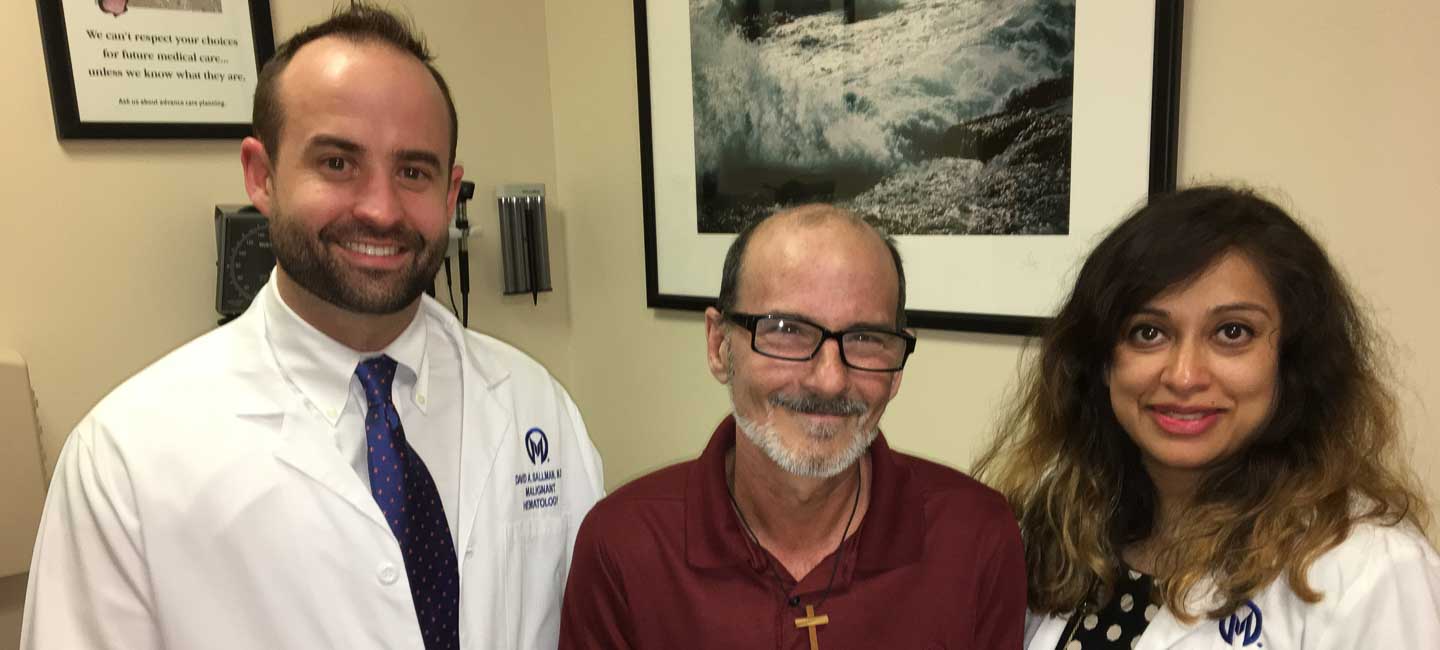CAR T Provides Remission, Purpose for Moffitt Leukemia Patient
Rodney Rodriguez found his purpose in life by being a medical “first.”
Through a clinical trial at Moffitt Cancer Center, Rodriguez became the first person whose acute myeloid leukemia went into remission as a result of Chimeric Antigen Receptor T-cell (CAR T) therapy. CAR T modifies a patient’s own immune cells to become better cancer fighters. It was named the biggest research breakthrough of 2017 by the American Society of Clinical Oncology. Only two types of CAR T have been approved by the Food and Drug Administration, and only for very specific patient populations: adults with diffuse B-cell lymphoma, or children and young adults with acute lymphoblastic leukemia.
Playing a role in expanding CAR T to more cancer patients, said Rodriguez, is the reason he’s here. “I’m spiritual,” he explained. “Having cancer and going through CAR T is what God dealt me so that I could help other people in some way.”
Last May, Rodriguez thought he would be spending his 52nd birthday in Moffitt’s bone marrow transplant unit. The only gift he wanted was an end to his two-year battle against acute myeloid leukemia (AML). He’d been told the genetic mutation that made his AML unusual probably meant his latest remission wouldn’t last and a transplant would be necessary.
It took a four-month international search to find a donor. With a good match identified, one last routine check of Rodriguez’s bone marrow yielded the worst possible news. Despite repeated hospitalizations and multiple rounds of chemotherapy, the leukemia had returned again. No longer in remission, the procedure was called off a week before his birthday transplant date.
“I was heartbroken,” said Rodriguez. His Moffitt transplant physician, Dr. Asmita Mishra, was, too. “She said, ‘with this much disease, you are not a candidate for transplant. You have also received a lot of chemotherapy prior to this. In order to go to transplantation, we are going to need an option that is out of the box.’”
Thankfully, medical oncologist Dr. David Sallman, had an outside of the box option. An assistant member of the Department of Malignant Hematology, he specializes in blood cancers like leukemia and in early-stage clinical trials of therapeutic strategies targeted to patients’ specific genetic mutations. One of them - a phase 1 trial called the THINK study (THerapeutic Immunotherapy with NKG2D) – looks at a new CAR T therapy that genetically modifies immune cells to target leukemia tumors.
Rodriguez was a perfect candidate for the THINK trial. He chose to participate without any hesitation. “If they can gain one solitary piece of information they didn't have before, it's a plus,” he said. “And we need a lot more pluses to be able to beat this disease.”
Within four weeks of receiving CAR T therapy on July 6 Rodriguez’s AML was back in remission. He was able to receive his bone marrow transplant on October 10. Ten months later, he remains cancer-free and has become the subject of an online case study authored by Dr. Sallman for the journal Haematologica.
“It is important to note this is the first time CAR T has induced a remission in AML,” said Sallman. “It is also the first time CAR T has been effective without the need of preconditioning chemotherapy.”
For CAR T treatment, T cells are removed from a patient’s blood and sent to a lab where the cells are genetically modified to better enable them to identify and attack cancer cells. Once the new cells are received, patients typically receive preconditioning chemotherapy to deplete their immune system and make room for the new cells. In the THINK study, no preconditioning chemotherapy was necessary.
“I was riddled with leukemia,” said Rodriguez. “But with CAR T – no chemo, no radiation, nothing else – it was gone in four weeks.”
“Our case study shows that CAR T therapy is a viable option for AML patients,” added Sallman. “We now need to take what we have learned in this initial patient and expand the trial.”


